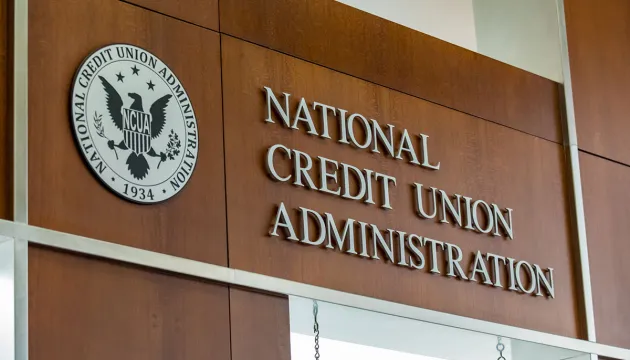What is the NCUSIF?
The National Credit Union Share Insurance Fund (referred to as either the “NCUSIF” or “Share Insurance Fund”) was created by Congress in 1970 to insure members' deposits in federally insured credit unions. Backed by the full faith and credit of the United States government, the NCUSIF insures the accounts of millions of account holders in all federal credit unions and the vast majority of state-chartered credit unions. It maintains at or near 1.30 percent of federally insured credit union deposits. By law, federally insured credit unions maintain one percent of their deposits in the Share Insurance Fund, and the NCUA Board can levy a premium if necessary. In the unlikely event of a credit union failure, the NCUSIF covers the balance of each member’s account, dollar-for-dollar up to the insurance limit, including principal and posted dividends through the date of the failure.
How Does Share Insurance Protect My Money?
Share insurance coverage offered through the NCUSIF protects members against losses if a federally insured credit union should fail. You can confidently join and conduct business with federally insured credit unions, because not one penny of insured savings has ever been lost by a member of a federally insured credit union. Historically, insured funds are available to members within just a few days after the closing of an insured credit union. Failures of federally insured credit unions are rare because only those with sound operational standards qualify to receive NCUSIF coverage. The NCUA also regularly reviews the operations of all federal credit unions and works closely with state regulatory authorities to evaluate federally insured, state-chartered credit unions.
How is My Credit Union Insured?
Credit unions encourage their members to save regularly to build economic security for themselves and their families. Deposits at all federal credit unions and the vast majority of state-chartered credit unions are covered by National Credit Union Share Insurance Fund protection. Not one penny of insured savings has ever been lost by a member of a federally insured credit union. Federally insured credit unions offer a safe place for you to save your money, with deposits insured up to at least $250,000 per individual member depositor. The National Credit Union Administration (NCUA) is the independent agency that administers the NCUSIF. Like the FDIC's Deposit Insurance Fund, the NCUSIF is a federal insurance fund backed by the full faith and credit of the United States government.

Share Insurance Estimator
Calculate the amount of your insured funds at a federally insured credit union using NCUA’s Share Insurance Estimator. The estimator can be used for personal, business or government accounts. Personal accounts include individual ownership, joint ownership, payable-on-death (accounts with named beneficiaries), living trusts and IRAs.
Share Insurance Resources
For questions about the NCUA’s share insurance coverage, call 1-800-755-1030, Monday through Friday, 8 a.m. to 5 p.m. Eastern, or send an email to DCAmail@ncua.gov. The toolkit contains a variety of helpful resources for credit unions regarding the Share Insurance Fund.
Frequently Asked Questions
If an informal revocable trust designates the account owner's formal trust as its beneficiary, the informal trust account will be treated as if titled in the name of the formal trust.
The Share Insurance Fund administered by the NCUA does not insure digital assets or cryptocurrencies. Credit unions use third-party service providers to provide their members with digital asset and cryptocurrency services. The services offered by these third-party providers can include exchange activities involving buying and selling digital assets or cryptocurrencies or digital asset storage services that hold these assets for credit union members.
As a courtesy and for informational purposes only, some credit unions include the value of their members’ digital assets and cryptocurrency holdings that are acquired through these third-party providers on the credit union’s mobile application. However, digital assets and cryptocurrencies do not represent shares at the credit union and are not covered by the Share Insurance Fund.
NCUA share insurance does not cover digital assets or accounts maintained at other entities that hold digital assets or cryptocurrencies for credit union members. The following are not covered by share insurance.
- The NCUA’s share insurance does not cover digital assets or cryptocurrencies offered through third-party vendors to credit union members, nor does share insurance extend to digital assets or cryptocurrency stored or held in custody by a credit union. Federal credit unions are not authorized to serve as a custodian for cryptocurrencies and other digital assets. Whether federally insured, state-chartered credit unions chartered in a particular state have the authority to serve as a custodian for cryptocurrencies and other digital assets depends on state law and regulation. There is no prohibition in the Federal Credit Union Act or the NCUA’s regulations preventing federally insured, state-chartered credit unions from conducting this activity, provided the credit union can do so safely and soundly and in compliance with all applicable laws and regulations.
- The NCUA does not insure assets or accounts issued by any entities other than a federally insured credit union, such as cryptocurrency companies. The NCUA’s share insurance does not protect against any such entity's default, insolvency, or bankruptcy, including cryptocurrency custodians, exchanges, brokers, and wallet providers.
- The NCUA’s share insurance does not apply to financial products held at investment companies or investment brokers, such as stocks, bonds, money market mutual funds, other types of securities, commodities, or cryptocurrencies.
By federal law, the NCUA only insures shares and deposits held in federally insured credit unions, which includes both federal credit unions and the majority of state-chartered credit unions. The NCUA’s share insurance coverage applies to accounts such as share drafts, regular shares share certificates, and certain other accounts offered by a federally insured credit union.
The Share Insurance Fund administered by the NCUA does not insure digital assets or cryptocurrencies. The NCUA insurance only covers insured shares and deposits in the unlikely event of a credit union’s failure.
Digital assets are broadly defined as any digital representation of value that is recorded on a cryptographically secured distributed ledger or any similar technology. Digital assets are not fiat currency, as they are not issued by a government entity. Digital assets include, but are not limited to:
- Convertible virtual currency and cryptocurrency;
- Stablecoins; and
- Non-fungible tokens (NFTs).
Cryptocurrencies are digital assets that can be used as a medium of exchange. Cryptocurrencies are not issued by a central bank, so no central authority (like the U.S. Federal Reserve) manages or upholds their value.
The member remains liable for any payments due on a loan or credit card. The member would continue making payments as they did before the credit union failed until they are instructed to do otherwise in writing by the acquiring credit union or the NCUA. If a member's credit union is liquidated and the member has both a loan and shares at the credit union, the NCUA may deduct the loan balance from the share balance.
If a liquidated credit union is acquired by another federally insured credit union, all direct deposits, including Social Security checks or paychecks delivered electronically, will be automatically deposited into your account at the assuming credit union. If the NCUA cannot find an acquirer for the liquidated credit union, the NCUA will advise members to make new arrangements.
Members who have uninsured shares may recover a portion of their uninsured shares, but there is no guarantee that they will recover any more than the insured amount. The amount of uninsured shares they may receive, if any, is based on the recovery of the failed credit union’s assets. Depending on the quality and value of these assets, it may take several years to conclude recovery on all the assets. As recoveries are made, uninsured account holders may receive periodic payments on their uninsured shares claim.
Federal law requires the NCUA to make payments of insured accounts "as soon as possible" upon the failure of a federally insured credit union. While every credit union failure is unique, there are standard policies and procedures that the NCUA follows in making share insurance payments. Historically, insured funds are available to members within just a few days after the closure of an insured credit union.
The NCUA would either transfer the insured member's account to another federally insured credit union or give the federally insured member a check equal to their insured account balance. This includes the principal and posted dividends through the date of the credit union’s liquidation, up to the insurance limit.
If a member has accounts in credit union A and credit union B, and credit union A merges into credit union B, accounts of credit union A continue to be insured separately from the share deposits of credit union B for six months after the date of the merger or, in the case of a share certificate, the earliest maturity date after the six-month period. In the case of a share certificate that matures within the six-month grace period that is renewed at the same dollar amount, either with or without accrued dividends having been added to the principal amount, and for the same term as the original share certificate, the separate insurance applies to the renewed share certificate until the first maturity date after the six-month period. A share certificate that matures within the six-month grace period that is renewed on any other basis, or that is not renewed, is separately insured only until the end of the six-month grace period.
